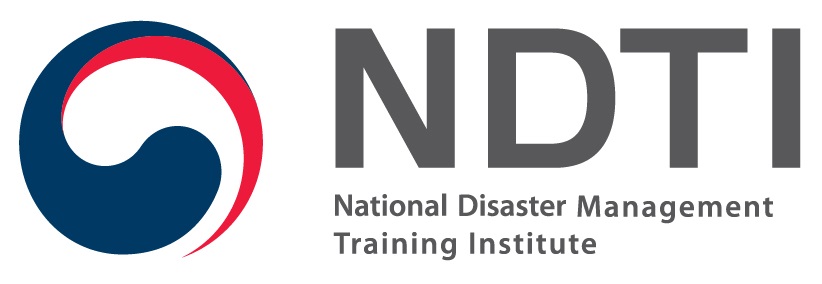
Institute Homepage
- E-learning Center
- International Training
- Institute Homepage
Training Programs
Application Process
1. Application Guide
Courses in Cooperation with ASEAN
Disaster Risk Management Capacity Building Program for ASEAN Member States
- Should be applied for by ASEAN member states
- Please complete and submit the application form to the ASEAN Secretariat at least 3 months before the start of the training.
Courses in Cooperation with KOICA
Capacity Building on Disaster Management using ICT, Disaster Risk Reduction for Sustainable Development (Joint Workshop with UNDRR)
- Should be applied for by government officials
- Please fill out and submit a Project Proposal to the KOICA Regional Office in your country at least 1-2 years before your desired training period.
Courses in Cooperation with ICDO
Capacity Building Program on Disaster Management for ICDO
- Should be applied for by ICDO member states
- Detailed application process will be informed later
Other Courses
- Should be applied for by country or organization
- A minimum of 15 participants is required for the courses
- To discuss course details, please contact NDTI by email at globalndti@korea.kr and ssunnie@korea.kr
The final selection of participants will be made in consultation between the cooperating agency
and NDTI based on factors such as application date and the ratio of participants from each country.
and NDTI based on factors such as application date and the ratio of participants from each country.
2. Training Expenses
Courses in collaboration with ASEAN, KOICA, ICDO
- The expenses for the courses will be covered by ASEAN, KOICA and ICDO respectively
Other Courses
- Participants are responsible for all expenses, including airfare, accommodation, meals, and training costs.
3. Others
Other Courses
- Visas must be obtained within the applicant's country in cooperation with the relevant cooperating agency
- For accommodation, please make an inquiry to NDTI at globalndti@korea.kr
-
The courses will be conducted in English.
- * If all participants belong to a language group other than English, interpretation services will be provided.
- Participants who are under the age of 56 are preferred.
Overview
1. Introduction
- Since 2006, NDTI has been designing and conducting customized programs for foreign government officials. As of 2024, our programs have been participated by 1,219 officials from 85 countries.
- The curriculum and program content are expertly tailored to meet the unique needs and demands of each participating country.
2. Training History
| Item | Total | '06~'10 | '11 | '12 | '13 | '14 | '15 | '16 | '17 | '18 | '19 | '20 | '21 | '22 | '23 | '24 |
|---|---|---|---|---|---|---|---|---|---|---|---|---|---|---|---|---|
| Trainee | 1,219 | 151 | 61 | 46 | 38 | 87 | 85 | 30 | 53 | 56 | 68 | 81 | 104 | 115 | 130 | 114 |
| Course | 74 | 11 | 4 | 3 | 3 | 6 | 6 | 2 | 3 | 3 | 4 | 4 | 5 | 6 | 7 | 7 |
| Country | 313 | 35 | 18 | 19 | 12 | 25 | 29 | 8 | 10 | 14 | 24 | 19 | 25 | 18 | 29 | 28 |
| Trainee / Continent | Asia-Oceania | Middle East | Eastern Europe | Central&South America | Africa |
|---|---|---|---|---|---|
| 1,219 | 794 | 82 | 118 | 99 | 126 |
3. NDTI International Program Overview
Other Courses
- Duration: 7 to 21 days
- Program Delivery Methods
- Offline : Invitational training, local seminars, expert dispatchs, etc.
- Online : Virtual training using an online training platform
- Blended : A combination of online and offline training
- Training Expenses
- Covered by participating countries or donor organizations such as UN, KOICA, etc.
- Program Contents
Module 1. Disaster Management Governance
- Laws & Regulations, Manuals
- Disaster Management System
- Prevention, Preparedness, Response and Recovery System
- Establishing Emergency Action Plan
- Disaster Response using Drones
- Safety Experience & Drill
Module 2. Natural Disaster Management
- Flood & Flash Flood Management
- Steep Slope & Landslide Management
- Volcanoes & Earthquake Management
Module 3. Early Warning Systems
- Prediction & Forecast
- Disaster Information Management
- Disaster Status Control & Dissemination
- Early Warning System(Installment, Operation, Maintenance etc)
Module 4. Raising Public Awareness
- Public Information & Raising Public Awareness
- Disaster Communication by Disaster Stage including Practice
- Characteristics of the Media Disaster Reporting Guidelines
- Disaster & Safety Experience
Module 5. Developing a Plan for Natural Disaster Prevention and Preparedness
- Country report session for understanding, sharing, discussing, and consulting with experts on each participating country's current situation,
major challenges, and for identifying developments in the first-year action plans - Workshops to set up tailored action plans on natural disaster management through the sharing of ideas
Extracurricular Activities
- Seoul, Jeonju and Busan Tour
- Korean Traditional Culture Experience
2025 Plan
Disaster Risk Management Capacity Building Phase Ⅰ
for ASEAN Member States
for ASEAN Member States
- 16th: 02.17. ~ 02.22. (6 Days)
15 government officials working in the field of disaster management
from ASEAN Member States
from ASEAN Member States
Capacity Building on Disaster Management using ICT
- 05.11. ~ 05.23. (13 Days)
15 government officials working in the field of disaster management
from developing countries
from developing countries
(Joint Workshop with UNDRR)
Capacity-Building Program for local Goverment Disaster Management officials
Capacity-Building Program for local Goverment Disaster Management officials
- 8 Days in October
15 officials working in the field of disaster management
from Local Goverment of Korea
from Local Goverment of Korea
Capacity Building Program on Disaster Management
for IDB
for IDB
- 10 Days in November
15 government officials working in the field of disaster management
from IDB member States
from IDB member States
Course Information
1. Disaster Risk Management Capacity Building Program for ASEAN Member States Ⅰ·Ⅱ
Eligible Participants
Government officials from ASEAN countries responsible for disaster management
Course Objective
To contribute to the reduction of disaster risk in the ASEAN region by fostering core disaster management talents in ASEAN member countries and improving disaster
response capabilities.
response capabilities.
Training Content
- Disaster Management Governance
- Disaster Management Systems and Related Technologies
- Natural Disaster Prevention and Response
- Disaster Response Training using Simulators
- Cultural Experience Activities
Training Period
Class No. 1 : 2025.02.17. ~ 02.22. D-CAB Ⅰ
Class No. 2 : In September 2025 (TBD) D-CAB Ⅱ
2. Capacity Building on Disaster Management using ICT
Eligible Participants
Government officials from developing countries responsible for disaster management.
Course Objective
To contribute to the reduction of the human and economic losses and damages caused by disasters by sharing Korea’s disaster management practices using ICT with developing countries that suffer from repeated natural disaster damages every year
Training Content
- Korea’s National Disaster Management Policy Direction
- Smart Disaster Management using ICT
- Natural Disaster Early Warning System including Earthquake, Landslide, Flood etc.
- Communication Strategies by Disaster Stages
- Group Discussions and Presentations (Country Reports, Action Plans etc.)
- Group and/or Individual Cultural Experience Activities
Training Period
Class No. 1 : 2025.05.11. ~ 05.23.
3. (Joint Workshop with UNDRR) Capacity-Building Program for local Goverment Disaster Management officials
Eligible Participants
officials from Local Goverment of Korea responsible for disaster management.
Course Objective
To minimize natural disaster damage in developing countries, Korea and the UNDRR aim to disseminate natural disaster mitigation policies,
climate change adaptation measures, and technologies through their joint efforts.
climate change adaptation measures, and technologies through their joint efforts.
Training Content
- (NDTI) DRR Activities in Korea such as Governance, System, Policies for DRR, Structural & non-Structural Measures for DRR
- (NDTI) Disaster Management using ICT such as Early Warning System, Disaster Status Control, Disaster & Safety Communication Network etc.
- (UNDRR) Global DRR Activities such as Comprehensive Climate and Disaster Risk Management(CRM), Risk Analysis for CRM and the Global Risk Assessment Framework (GRAF), Using Early Warning Effectiveness Indicators etc.
- (NDTI) Disaster Risk Reduction by Disaster Types
- Group Discussions and Presentations (Country Reports, Action Plans etc.)
- Group and/or Individual Cultural Experience Activities
Training Period
Class No. 1 : In October 2025 (TBD)
4. Capacity Building Program on Disaster Management for IDB
Eligible Participants
Government Officials working in the field of disaster management from IDB member states
Course Objective
To increase overall capacity for the disaster management system and to build the capacity of human resources working in the disaster management field
Training Content
- National Disaster Management Governance and Policies
- Natural Disaster Management System such as Flood Management, Steep Slopes & Landslide Management, Earthquake Management
- Raising Public Awareness on Disaster & Safety
- Cultural Experience Activities
Training Period
Class No. 1 : 10 Days in November













